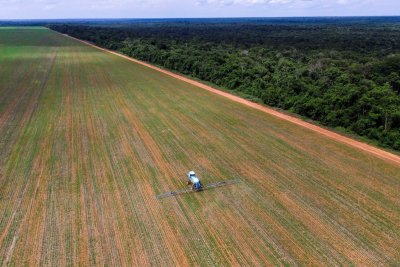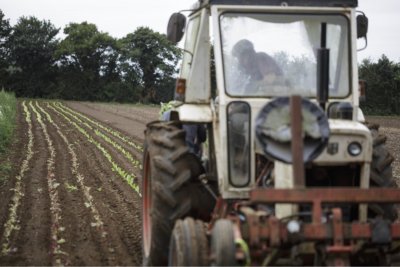News • Sustainable Farming Campaign
Rise in UK-Brazil trade threatens to speed up destruction of Amazon rainforest and other precious ecosystems
A new report released today reveals that ongoing trade discussions between the UK and Brazil are likely to lead to an increase in pesticide-related harms in both countries.

Toxic Trade Brazil – co-authored by PAN UK, Sustain and Dr Emily Lydgate – outlines how the growth in trade with Brazil being pursued by the UK Government could mean that British consumers unwittingly find their diets driving serious health and environmental impacts on the ground in Brazil where their food is grown.
Josie Cohen, Head of Policy and Campaigns at Pesticide Action Network UK, said:
“The UK Trade Secretary is promoting trade with Brazil as providing ‘real opportunities to go further on green trade’(1). Meanwhile, Brazil’s overuse of highly toxic pesticides is contributing to the destruction of the Amazon and other crucially important ecosystems, contaminating water and poisoning farmworkers and communities. And yet the Government has provided no detail on how it will ensure that Brazilian food sold on UK shelves is not contributing to the global climate and nature crises.”
Brazil is the third largest user of pesticides globally and its so-called “Poison Package”, which is currently being pushed through Congress by President Bolsonaro, has slashed laws designed to protect human health and the environment from pesticides (2). The country’s pesticide standards are far weaker than those of the UK with almost double the number of highly hazardous pesticides allowed for use, including the lethal herbicide paraquat and bee-toxic neonicotinoids.
The UK already imports significant amounts of food and animal feed (largely soya) from Brazil, both of which are likely to grow under a new trade agreement. While food imports are subject to UK safety limits for the amount of pesticide residues allowed to appear in a particular item, there are no such limits placed on feed. As a result, highly toxic pesticides banned for use in the UK due to health or environmental concerns can be used to grow Brazilian soya on deforested land. Soya beans are already Brazil’s largest agricultural export to the UK, with as much as 90 percent fed to animals.
Vicki Hird, Sustainable Farming Campaign Coordinator at Sustain said:
“Most UK consumers have no idea that some of the meat they’re eating has been fed on soya grown using highly toxic chemicals. Right now, the UK Government is talking a good game on reducing pesticide harms in the UK, but appears to have no problem with exporting our environmental and human health footprints to Brazil.”
The report also exposes how an increase in trade with Brazil threatens to weaken the UK’s own domestic pesticide standards, with negative knock on effects for both public health and the environment. As a major agricultural exporter, Brazil would have much to gain from a drop in UK standards, which currently exclude food exports containing pesticides in amounts that exceed UK safety limits. Brazil tends to allow larger amounts of highly hazardous pesticides to appear in food than the UK.
As just one of many examples included in the report, Brazilian lemons grown for the home market are allowed to contain 200 times the amount of the insecticide dimethoate than those allowed to be sold in the UK. Lemons are already a key export to the UK which would be likely to increase under a trade deal. Dimethoate has been shown to have links to cancer and is banned in the UK for reasons which include the risk posed to consumer health through long-term exposure via diet.
A rise in agricultural exports from Brazil also poses an economic threat to the future of UK farming. Judging by the UK-Australia Free Trade Agreement – the only new trade deal the UK has signed post-Brexit – it seems highly likely that an agreement would increase quotas under which Brazilian agricultural exports receive low tariffs, providing an incentive for Brazil to export more to the UK. This threatens to undercut UK farmers with a flood of cheap imports grown on a larger-scale and to lower environmental standards. Dr Emily Lydgate, Specialist in Environmental Law at the University of Sussex, said:
“The UK Government continues to pursue increased agricultural trade with Brazil, but the intensification of agricultural production there has been linked with deforestation and highly hazardous pesticides which harm wildlife and ecosystems. The UK should ensure that it is not contributing to this problem.”
Key recommendations for the UK government:
- Put additional measures in place (that go beyond UK safety limits for residues in food) to ensure that Brazilian agricultural imports are not driving pesticide-related harms to either human health or the environment in Brazil.
- Do not allow any weakening of UK pesticide standards as a result of an increase in trade with Brazil.
- Prevent UK farmers from being disadvantaged by cheap food imports produced to weaker pesticide standards in Brazil.
Read the report here.
Notes
- Tweet from the Secretary of State for International Trade (18th January 2022)
- Brazil: Jair Bolsonaro’s Brazil changes the law on pesticides, endangering human and environmental health, report by Justice Pesticides (December 2021)
- This report is part of the Toxic Trade series which looks at the potential impact of post-Brexit trade deals on the pesticide standards of the UK and its trading partners.
Published Wednesday 23 February 2022
Sustainable Farming Campaign: Sustain encourages integration of sustainable food and farming into local, regional and national government policies.





